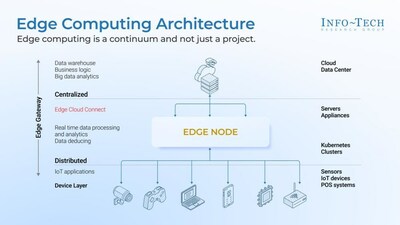As the pace of digital transformation continues to accelerate, organizations worldwide are confronted with a host of challenges stemming from the limitations of traditional computing frameworks, from latency issues to bandwidth constraints. The need for instantaneous data processing and analysis has never been more critical. Edge computing is a transformative solution, offering the promise of real-time insights and actions. However, for many organizations, the journey to edge computing adoption is fraught with complexities – from intricate system integrations to ensuring network reliability and data security. In response to the urgency of addressing these challenges, Info-Tech Research Group has published its latest research blueprint, Initiate Your Edge Computing Journey.

The firm’s new resource offers actionable insights for IT leaders starting their edge computing journey. Info-Tech explains that through a thorough understanding of the unique requirements of the operating ecosystem and implementing robust architectures and security measures, organizations can harness the full potential of edge computing while mitigating associated risks. The approach will ultimately drive innovation, efficiency, and unparalleled business value.
As outlined in Info-Tech’s blueprint, edge computing is a computational model that relates to various networks and devices located near the end users. At its core, edge computing involves processing data in close proximity to its source, resulting in accelerated data processing at higher capacities. This produces immediate and action-oriented outcomes in real-time.
“While traditional cloud technology grapples with standard issues like latency, connectivity problems, and cost constraints, a diverse array of organizations spanning manufacturing, retail, healthcare, and energy sectors are capitalizing on the transformative benefits of edge technology,” says John Donovan, Principal Research Director, Infrastructure & Operations Practice, at Info-Tech Research Group. “By processing data at the edge, these enterprises unlock real-time processing, analytical prowess, and agile decision-making capabilities.”
The firm’s research underscores that a lack of planning and a misunderstanding of scalability and data protection requirements can lead to the failure of edge projects. Additionally, the resource touches on concerns about safeguarding data from malicious activities at the edge, which Info-Tech advises must be mitigated. Recognizing that success hinges on comprehensive planning, Info-Tech emphasizes for IT leaders and their organizations the importance of understanding specific use cases, technical requirements, and the operational ecosystem before implementation. IT leaders must carefully consider factors such as hardware selection, software frameworks, data security, and system integration.
The research outlines the following ways that edge computing can address challenges and provide significant benefits over centralized computing in various computing environments:
- Reduced Latency: Edge computing brings data processing closer to the data source, minimizing the time it takes for data to travel to centralized data centers and back. This reduced latency is crucial for applications that require real-time responses, such as Internet of Things (IoT) devices, autonomous vehicles, industrial automation, and augmented reality.
- Bandwidth Optimization: When processing data locally at the edge, only relevant information needs to be sent to the central cloud, reducing the amount of data transferred over networks. This optimization is particularly valuable in scenarios with limited bandwidth or high data transmission costs.
- Scalability and Distributed Processing: Edge computing supports distributed processing, allowing applications to scale horizontally by adding more edge nodes. This is especially useful for handling spikes in data volume or computation demand.
- Local Insights and Decision-Making: Edge computing allows organizations to extract insights and make decisions locally without needing to transmit all data to central servers. This is valuable in situations that require immediate action, such as predictive maintenance in industrial settings.
- Offline and Intermittent Connectivity: Edge computing enables applications to operate offline or with intermittent connectivity by processing data locally. This is essential for remote areas, industrial sites, and transportation systems where continuous connectivity cannot be guaranteed.
Info-Tech also highlights the inherent vulnerability of edge and IoT devices installed outside managed data centers or cloud environments, making them susceptible to data loss or theft, both digitally and physically. The firm recommends that addressing these concerns should be an integral part of projects aimed at bringing data and analysis to the source, requiring IT architects to be vigilant about these threats.
Info-Tech Research Group has also opened registration for its upcoming webinar on the potential of edge computing. The complimentary webinar will be hosted on Wednesday, April 3, 2024, at 1:00 PM ET | 10:00 AM PT. Register to attend the event and gain insights on the subject from John Donovan, an expert in infrastructure and operations.
For exclusive and timely commentary from John Donovan and access to the complete Initiate Your Edge Computing Journey blueprint, please contact pr@infotech.com.
About Info-Tech Research Group
Info-Tech Research Group is one of the world’s leading information technology research and advisory firms, proudly serving over 30,000 leaders. The company produces unbiased and highly relevant research to help CIOs and IT leaders make strategic, timely, and well-informed decisions. For more than 25 years, Info-Tech has partnered closely with IT teams to provide them with everything they need, from actionable tools to analyst guidance, ensuring they deliver measurable results for their organizations.
Media professionals can register for unrestricted access to research across IT, HR, and software and hundreds of industry analysts through the firm’s Media Insiders program. To gain access, contact pr@infotech.com.
For information about Info-Tech Research Group or to access the latest research, visit infotech.com and connect via LinkedIn and X.


